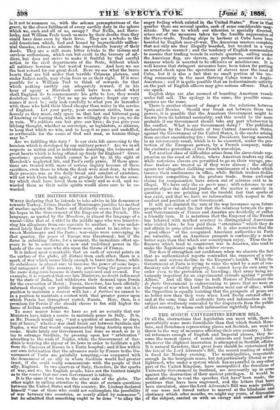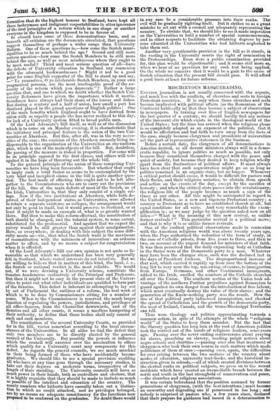THE SCOTCH UNIVERSITIES REFORM BILL.
OF all the obstructions that legislation can meet with, there is proverbially none more formidable than that which Scotch Mem- bers, and Scotohmen representing places not Scottish, are wont to throw in the way of measures affecting their own country. Libe- ral reformers enough of English and Imperial abuses, they be- come the merest slaves of vested interests and local prejudices whenever the slightest innovation is attempted in Scottish affairs. It is natural therefore, that great fears should be entertained for the fate of the Lord Advocate's Bill, the second reading of which is fixed for Monday evening. The municipalities, respectable enough in the bourgeois sense, but not particularly liberal or en- lightened, who under a system which has no parallel in any other part of the United Kingdom, have monopolized the functions of University Government in Scotland, are necessarily up in arms against the destruction of their ancient privileges. It would be almost affecting to read the speeches that have been made, the petitions that have been engrossed, and the letters that have been circulated, since the Lord Advocate's Bill was made public, if one were not forced rather to marvel at the blindness and. obstinacy which after menthe, we might say years, of discussaon of the subject, carried on with an energy and command of in- formation that do the highest honour to Scotland, have kept all those lachrymose and indignant respectabilities in utter ignorance of the first principles of a reform which in one shape or another everyone in the kingdom is supposed to be in favour of. So absurd have some of these demonstrations been, and so beneath all criticism are the documents circulated, that questions suggest themselves of perhaps a wider range than University Reform. One of these questions is, how come the Scotch muni- cipalities to be so much behind the age ? Second and still more serious question—how come the Scotch Members to be still more behind the age as well as most mischievous where they ought to be most useful? Third and most serious question of all—have the defects of University education in Scotland any connexion with the aforesaid backwardnesses ? Might it not be a good point for some English supporter of the Bill to stand up and say,
Ye yourselves, 0 ye intolerable Scotch Members, in your own pragmatical persons, are the most irrefragable proof of the ne- cessity of the reform which you deprecate " ? Rather a large question that, and one to which we doubt whether the Scotch Uni- versity Reformers have given the importance which it merits. Scotchmen have always had their share of the loaves and fishes. But during a century and a half of union, how small a part has Scotland played in the grand questions of English politics ! One of the main benefits which England ought to have derived from union with so capable a people she has never realized to this day, for lack of a University system fitted to breed public men. Of the Lord Advocate's Bill itself, as well as of the discussion which is to come on on Monday evening, it is characteristic that the initiatory and principal feature is the union of the two Uni- versities at Aberdeen. But this, after all, was in the very neces- sities of the case ; the excision of the Aberdeen anomaly being in- dispensable to the organization of the Universities on one uniform plan, which is one of the main objects of the bill. But, doubtless, the passing of the measure is risked in proportion. For some will be on principle opposed to the first clause, and others will vote against it in the hope of throwing out the whole bill.
To the general principle of the union of these competing Uni- versities we have long been favourable. But whether that ought to imply. such a total fusion as seems to be contemplated by the very brief and inexplicit clause in the bill is quite another ques- tion. The best mode of effecting this ought not to be left alto- gether to the Commissioners who are to carry out the provisions of the bill. One of the main defects of most of the Scotch, as of the Irish, Universities is, that they only consist of a single col- lege. Now if the two institutions at Aberdeen, while both de- prived of their independent status as Universities, were allowed to retain a separate existence as colleges, the arrangement would not only be good in itself, but it would preserve to Scotland, or at least it might be made an example of what is so greatly wanted there. But then to make this reform effectual, the constitution of both should be changed, and the tutorial system, to some extent, substituted for the professorial. And against that we expect the outcry would be still greater than against their amalgamation. Here, as everywhere, in dealing with this subject the same diffi- culty meets us—viz., that what the Scotch want is the maximum of reconstitution with the minimum of innovation : an arduous matter to effect, and by no means a subject for congratulation when it is effected.
Of the Lord Advocate's Bill our own opinion is not quite so fa- vourable as that which we understand has been very generally felt in Scotland, where vested interests do not interfere. But we are willing to believe that in matters of this kind, the local, i. e., the Scotch or national verdict is the most reliable. We would not, if we were devising a University scheme, constitute the Senatus Academieus exclusively of the Principal and Professors. But then it might not be easy in the present state of the Univer- sities to point out what other individuals are qualified to form part of the Senatus. This defect is inherent in attempting to lay out by act of Parliament the outlines of a reform, the real work of which is to be done by Commissioners sitting for a number of years. When to the Commissioners is reserved the much larger function of regulating the powers, jurisdictions, and privileges of all office-bearers, from the Chancellor downwards, and of the Senatus and all other courts, it seems a needless hampering of their authority, to define that those bodies shall only consist of such and such members.
The constitution of the several University Courts, as provided for in the bill, varies somewhat according to the local circum- stances of the Universities. In all alike we find the defect that only two members are to be directly elected by the general council of the University. But possibly the powers or influence which the council will exercise over the nomination to offices which qualify for a University court may compensate for this defect. As regards the general councils, we see much mischief in their being formed of those who have accidentally become graduates. We should like to see a special provision enabling all who have at any time gone through the necessary studies, to take out their degrees on moderate terms, irrespective of the length of their standing. The University councils will have so much power in their hands, both as controllers and electors, that it is highly requisite that they should be made to include as much as possible of the intellect and education of the country. The Scanty numbers who hitherto have casually taken out a distinc- tion to which no credit attached, and no privileges belonged, are by no means an adequate constituency for the functions now proposed to be conferred on the graduates. No doubt there would is any case be a considerable pressure into their ranks. The evil will be gradually righting itself. But it strikes us as a great mistake to set out with a council not adequately representing the country. To obviate that, we should like to see it made imperative on the Universities to hold a number of special commencements, and in other respects to facilitate the obtaining degrees by per- sons educated at the Universities who had hitherto neglected to take them out.
Another very questionable provision in the bill as it stands, is the vesting in the University courts the right of nomination to the Professorships. Even were a public examination provided for, this plan would be objectionable ; and it seems still more so, when we hear of no provision for any such test being applied. On the whole we conceive that it would be a gain to the cause of Scotch education that the present bill should pass. It will afford a good basis at least for future reforms.



































 Previous page
Previous page